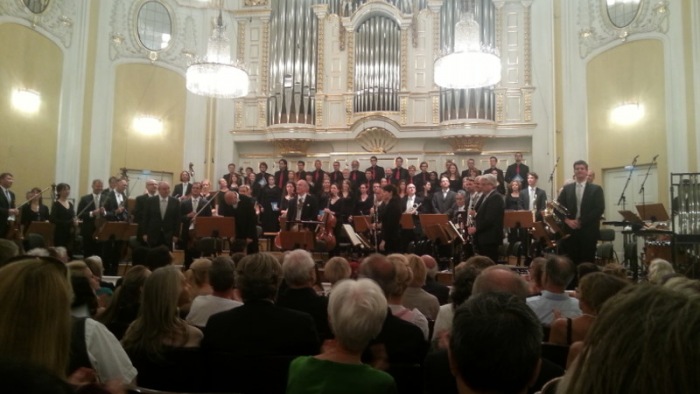World Premiere of the "Passion Giordano Bruno"
Composer Gerhard Wimberger celebrated in Salzburg with standing ovations

wimberger1.jpg
World premiere in the Mozarteum
It was a memorable musical event: Last Saturday (8/31/2013) the "Passion Giordano Bruno" by Gerhard Wimberger was premiered at the end of the Salzburg Festival. Composed in 2007 for bass baritone, speaker, choir and orchestra, the work shows the devastating consequences of fundamentalist belief systems in the life and death of Giordano Bruno and left a strong impression on the audience in the Great Hall of the Mozarteum. When gbs adviser Wimberger, who celebrated his 90th birthday the day before, entered the stage, the audience and participants rose to long ovations.
Contemporary classical music is regarded as difficult and emotionally hardly comprehensible. Gerhard Wimberger's "Passion Giordano Bruno" proves, however, that it is indeed possible to write music that is both demanding and touching. Even traditional classical listeners, who came to the Mozarteum primarily because of the Prague Symphony by Wolfgang Amadeus Mozart performed in the first part of the concert, were deeply impressed by Wimberger's highly dramatic but by no means showy composition.
On the one hand this was due to the clever selection of texts that Gerhard Wimberger made in order to illustrate the central ideas and the fate of the great natural philosopher Giordano Bruno, who was executed as a heretic in 1600, and on the other hand to his unconventional way of using the elements of contemporary music. Like many contemporary composers, Wimberger presents shrill dissonances, but unlike most of his colleagues, he is not afraid to use a straight C major chord or a palaestrina chorus when he deems it appropriate. And so his work captivates with an unusual richness of timbres that evoke different moods in the listener. Lyrical passages suddenly merge into powerful sound eruptions, in which the composer in particular accentuates the percussion section of the orchestra, which is well staffed with four players. The interweaving of sung and spoken language also contributes to the fact that the listener's suspense over the 45-minute duration of the Passion never diminishes.
Of course the success of a piece does not only depend on its compositional structure but also on the quality of the musical performance - and in this respect one can only congratulate the Salzburg Festival directorate on the successful selection of the premiere's protagonists! You could feel with every note how deeply star conductor Hans Graf - returning to the Salzburg Festival for the first time in two decades for this concert after a successful engagement in America - had delved into Wimberger's composition. Under his direction, the outstanding Mozarteum Orchestra and the Salzburg Bach Choir, rehearsed by Alois Glassner, explored all the nuances of this complex work.
Both soloist roles were also excellently cast: Castle actor Peter Simonischek, who after Klaus Maria Brandauer and Ulrich Tukur had played the Everyman for many years, performed the text passages of the chronicler with great but never excessive expression. Bass-baritone Roman Trekel proved why he is one of the best in his field with a haunting interpretation of Giordano Bruno's part. This part cannot be sung more beautifully and touchingly.
Since I have known the score of the Passion for years (I had made a small contribution during a visit to Salzburg at the beginning of 2007 to Gerhard Wimberger tackling the composition), I have known for a long time that the "Passion Giordano Bruno" is an extraordinary piece of contemporary music, but the brilliant premiere in Salzburg exceeded my expectations. It set standards for future performances of the work, which I believe has an excellent chance of becoming an integral part of the future's classical repertoire.
In this sense, the premiere of the "Passion Giordano Bruno" at the end of the Salzburg Festival in 2013 was indeed a memorable, even historical event: it was the first time that such a work with such a statement had been performed at one of the most important classical music festivals in the world - and I am sure it will not have been the last.
Michael Schmidt-Salomon
